Interview with Doug Kirkpatrick, startup team member of Morning Star and co-founder of the Morning Star Self-Management Institute. Famous for being built on their principles of self-management, which has led to that Morning Star is today the largest tomato processing in the world. Today Doug has left Morning Star to spread his experience as a speaker, author, and consultant.
In his book, Beyond Empowerment, Doug tells the story of how Morning Star became an example of true empowerment. He tells us how they went beyond traditional ways of delegating (empowering) and creating a self-managed and truly empowered company.
I found Morning Star to be an intriguing and fascinating story! I have been following the company for quite a while and recently had the fortune to meet with Doug. During one of our discussions, he shared the fascinating story and his experience as one of Morning Star’s original colleagues.
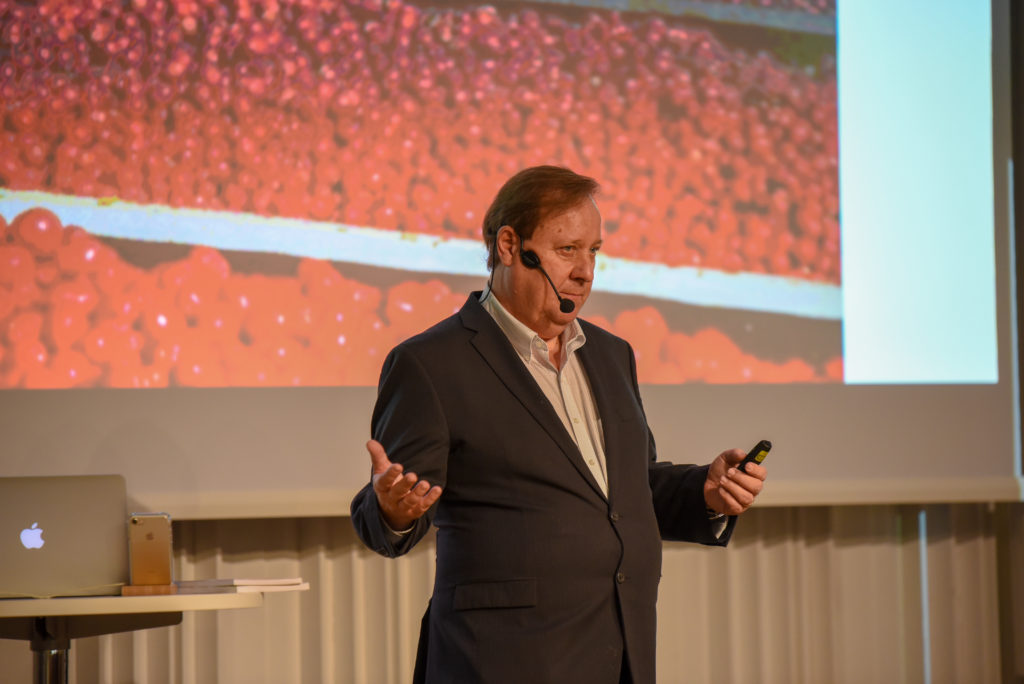
To learn how you can operate a large successful company in a very agile way based on self-management and a few simple but powerful organizational principles, then continue reading.
Doug, tell me how it all got started?
I was working as a financial controller together with Chris Rufer in a traditional company before Chris went on to later start Morning Star. There we had experienced all the typical problems of a traditional organization. There were layers of coordination, and the senior managers got more and more frustrated with wasting time on operational details.
One day Chris got some insights as he was signing checks. He came to one particular realization that the purchase order was a legally binding contract. And as a legal liability, Chris had to sign the check. If he didn’t sign the check, he would be sued, so he was adding zero value to the process.
Another insight came as he was watching people drive to work. Chris realized that everyone is already a manager in his or her personal life, where we all make life-changing decisions on our own without a boss. We decide who to date and marry, where to go to college, whether to buy a car or to have children, etc. Somehow we make all these life-altering decisions. We are already managers in our lives. So the key insight is that if people know what to do and how to do it, why would they need a human boss? And he decided the answer was: they don’t.
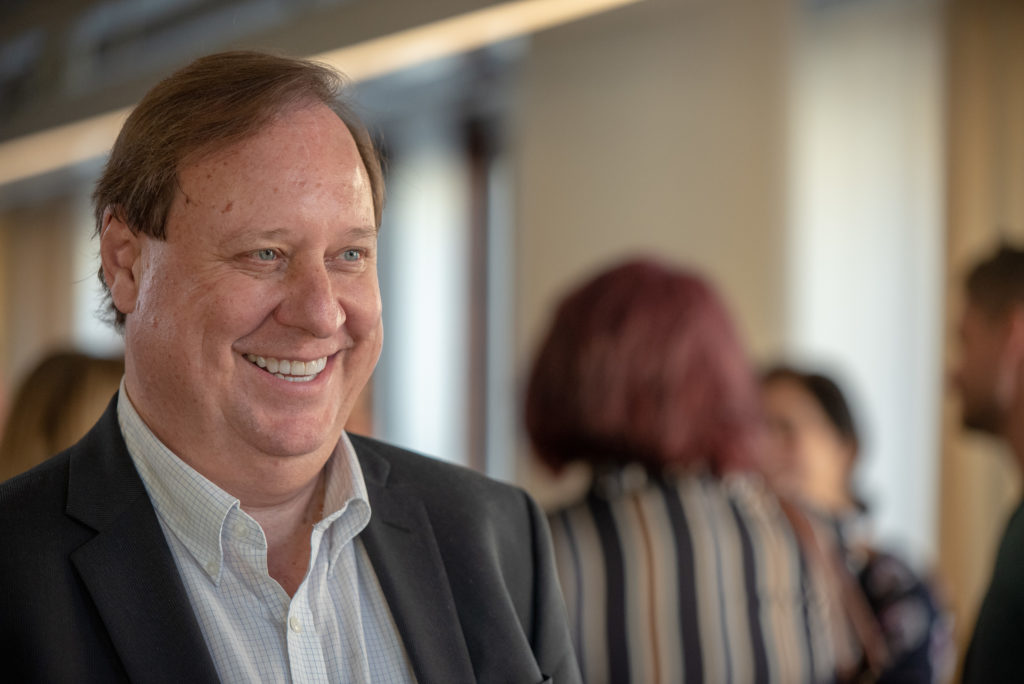
Building a company of only two fundamental principles
So when Chris went on to start Morning Star, he decided early on two basic principles:
1) people shouldn’t use force against other people
2) people should keep the commitments they make to other people
He contended that these principles are the most foundational in human interaction. And if you think about these principles, they are the foundation of all law everywhere in the world.
Imagine a world where everyone aligned with these principles. You wouldn’t need armies, police, or looks on your door. That is not realistic, but the point is that we get to that idea, the more happiness, better teamwork, and prosperity we would experience.
Imagine a world where everyone kept their commitments. It is the foundation of contract law. If we all got better at keeping our commitment, it would have a positive impact.
The great experiment was to apply these principles to organizations. From that moment, Morning Star has been a self-managed company for almost 30 years. We have never had a human boss.
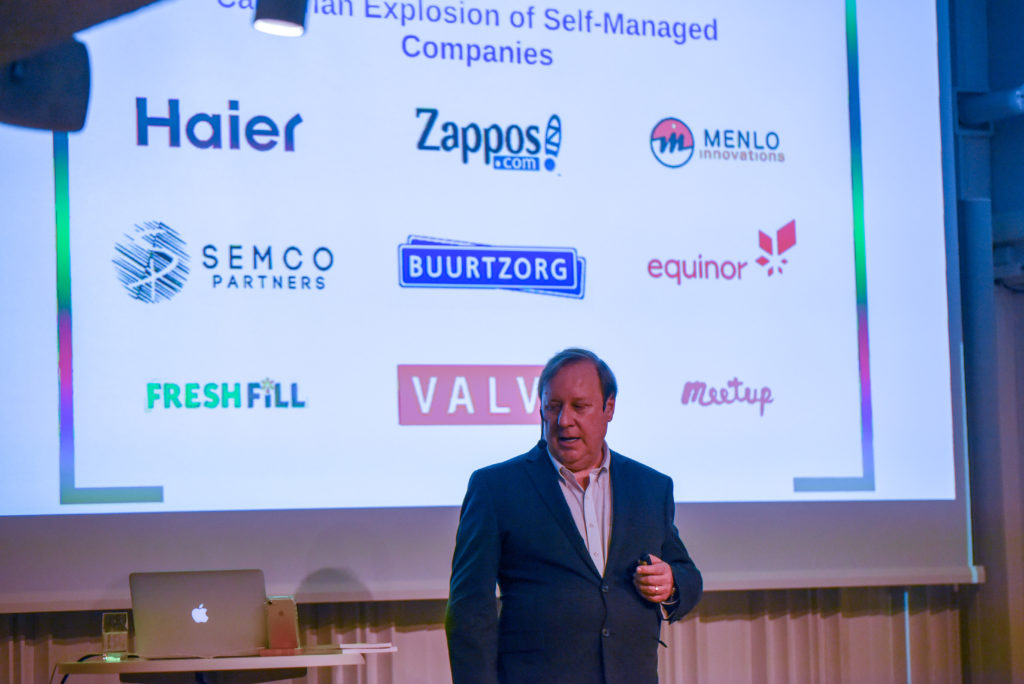
Doug keynoting at Agile People Sweden conference 2018
The founder of Visa, Dee Hock said :
Simple, clear purpose and principles give rise to complex and intelligent behavior. Complex rules and regulations give rise to simple and stupid behavior.
—Dee Hock
So we thought we should align us to that.
In most companies we do the opposite, our tendency is trying to control complexity with more rules. But is it really enough to build an organization based on these two principles?
It depends on the company. What we found was that after six years, when we had grown to more factories, we had some more scaffolding and support. That is when we came up with the CLOU—a Colleague Letter of Understanding, The Colleague Letter of Understanding is a peer agreement. The agreement provides your why, your purpose, what excellence looks like in your role, and how to support the mission and vision in the enterprise. The CLOU also clarifies the processes for which you are accountable, plus your decision-making authority and is a map to know you are doing a good job. There is no boss to tell you. We use gamification so that people can play the game of work with some performance metrics called “steppingstones” towards perfection.
We believe in
- Clarity
- Transparency
- Accountability
These principles are operationalized through the CLOU. The CLOU starts with the individual, but teams that are linked together or dependant can create a CLOU in between them as well.
Our organization looks like a neural network or a spider web. In fact, a spider web, by weight, is five times stronger than steel. So if someone leaves, the rest of the network would instantly adjust and compensate for the change in real-time. It is very resilient.
I would assume this eliminates the need for the typical company-initiated big change initiatives?
Everyone is free to initiate any change. You make a case for what you want to achieve and involve people affected.
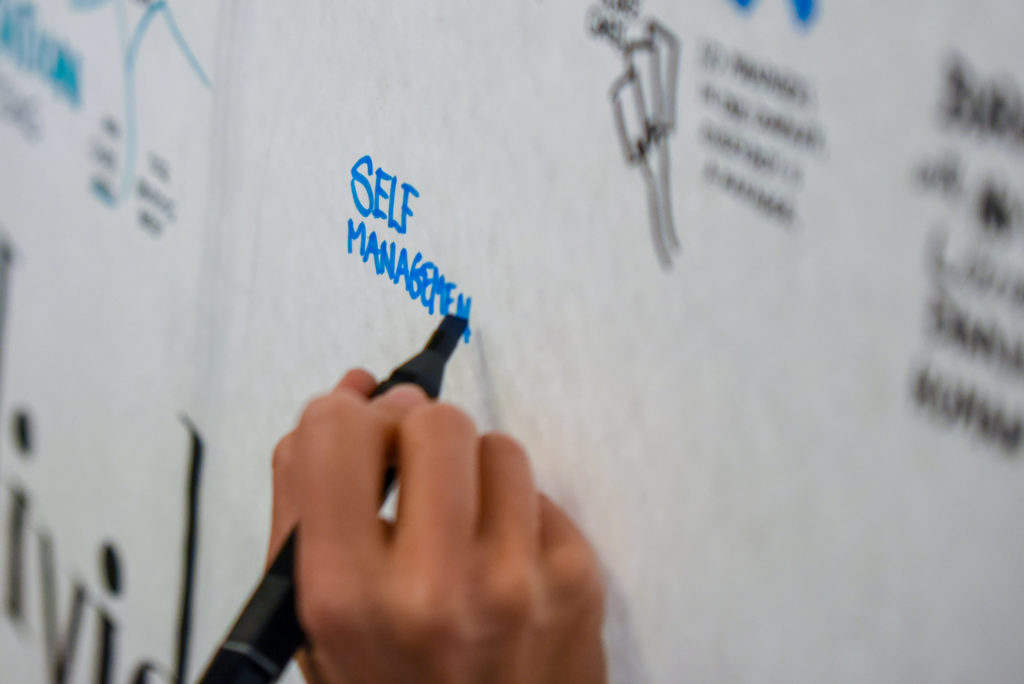
You wrote a book on empowerment. What ́s your view on empowerment?
Most empowerment programs are based in traditional organizations that start with that someone with power giving his or her power to a subordinate who has less power. The problem with that is that what it’s been loaned can be repossessed at any time. And everyone knows that.
Self-management is truly beyond empowerment, hence the name of my book. It’s not about one individual with power lending their power; it’s about everyone having power from the time they join. If you are free from coercion and free from the use of force, it means that no one can walk up to a person and tell them to stop doing or start doing anything.
Everything is resolved through request and response, but you have an obligation to respond to a request. Everyone can make a request of anyone without exception, and that is a radical paradigm shift for most traditional managers.
You have recently written a new book, From Hierarchy to High Performance. What’s it about?
Hierarchy to High Performance is a multi-author collaboration with Bill Sanders, Dawna Jones, Brooke Erol, Sue Bingham, Josh Levine, Anna McGrath and myself. It’s a compilation of diverse perspectives on how we can move beyond traditional organizational approaches and create great work cultures that are as creative, innovative and life-affirming as the people who work inside them. In fact, our team is a consortium of practitioners and thought leaders going by the name Great Work Cultures, and we’re all dedicated to the idea of unleashing the limitless potential of human beings. My chapter is called “The Age of the Self-Managed Organization”.
My latest book, released just this past July by Forbes Books, is called The No-Limits Enterprise: Organizational Self-Management in the New World of Work. It’s a more personal and expansive view on the power and purpose of self-management, infused with stories, tools, and approaches that make the concepts of self-management accessible to anyone curious to learn more.
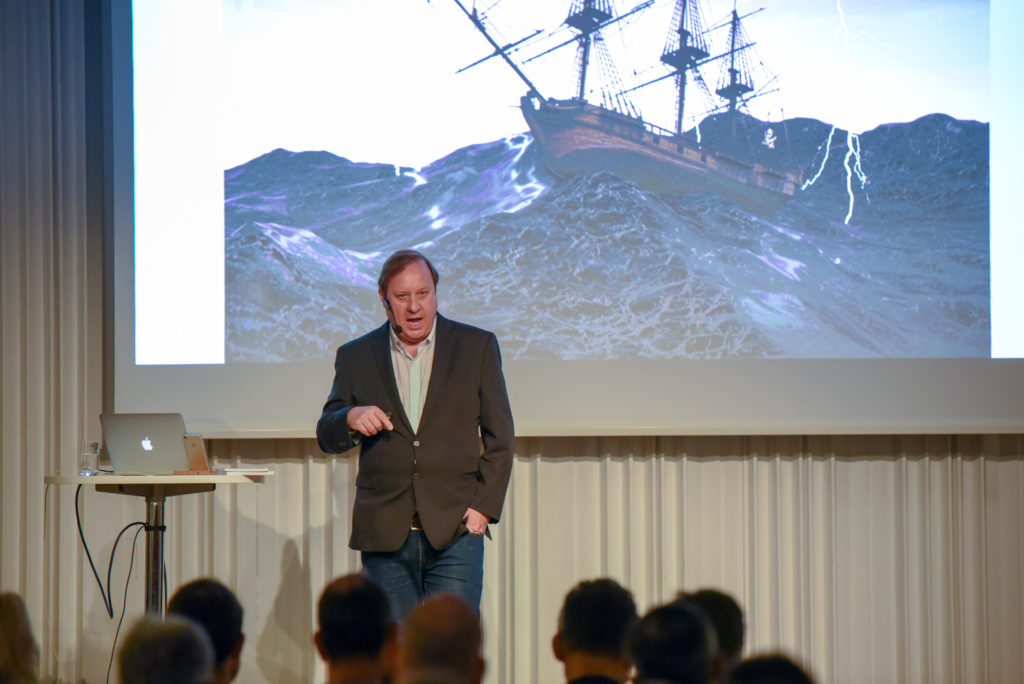
What would you recommend as good resources to learn more about self management?
- The management innovation exchange launched by Gary Hamel
- Doug’s website Nufocus group
- Doug’s blog Redshift3
Here are some more resources on self-management related to Doug.
- Beyond empowerment – are we ready for the self-managed organization? Doug Kirkpatrick at TEDxChico
- Keynote at Agile People Sweden Conference 2018 – Future of work: Managing Complexity With Simplicity
- Interview with Doug on the very good podcast Leadermorhopsis
- He has recently released his second book, From Hierarchy to High Performance Unleashing the Hidden Superpowers of Ordinary People to Realize Extraordinary Results.
- Doug’s latest book with Forbes Books: The No-Limits Enterprise: Organizational Self-Management in the New World of Work
Meet Doug in person in spring 2021 No-Limits Self-Management (remote), April 13-14 2021




Very good content